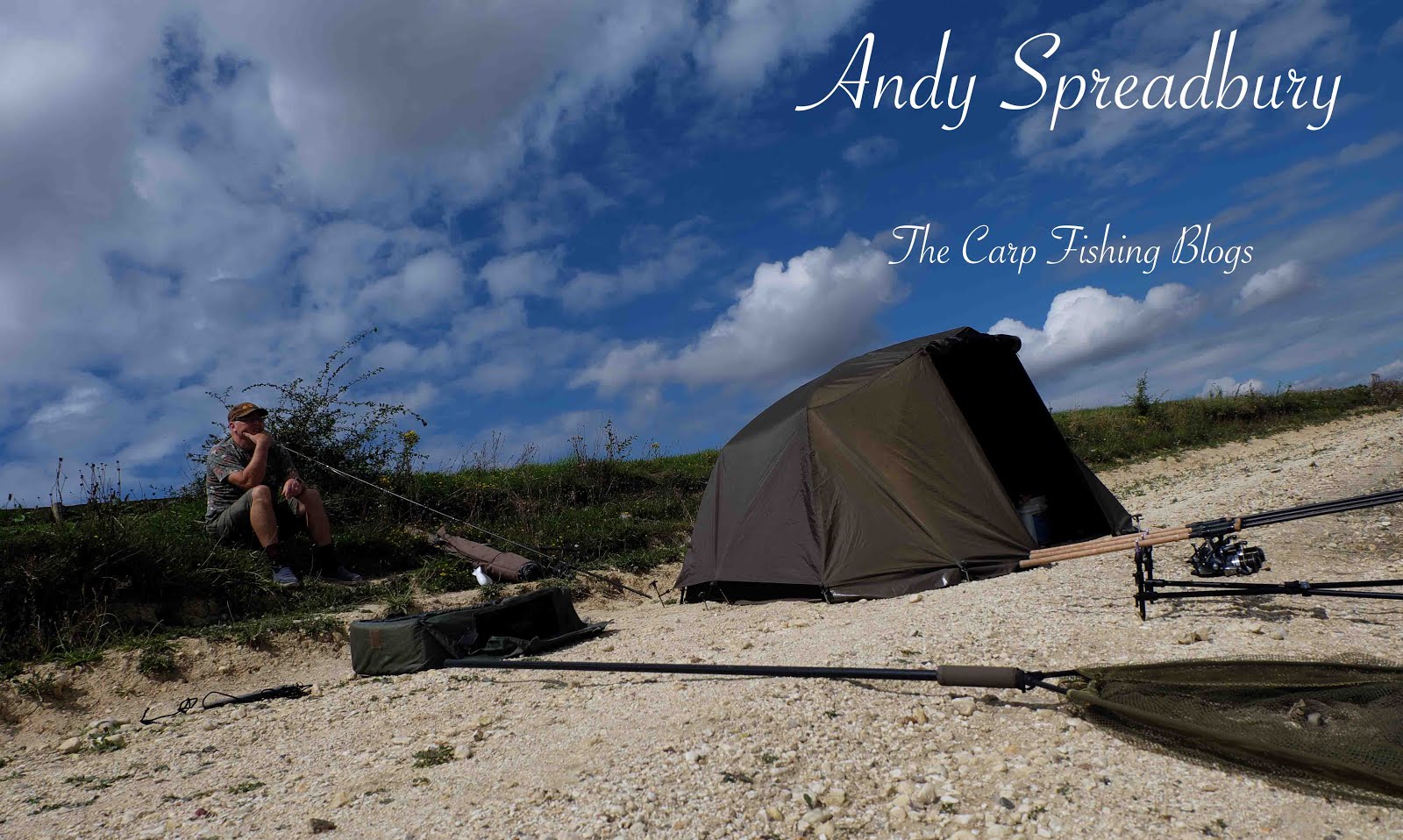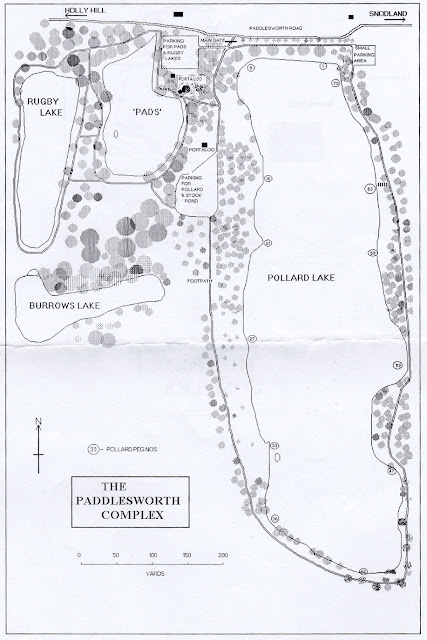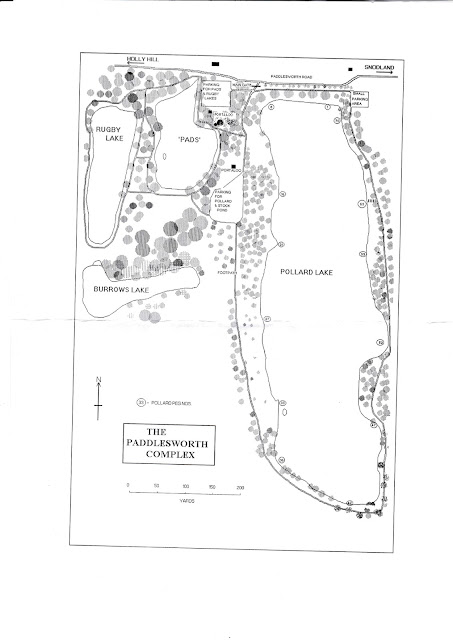It had been a fortnight since I was last at the lake. Christine and I have been off on our travels around the Mediterranean on the cruise ship Oceana and had seen many wonderful sights - including the amazing Krka National Park near Split in Croatia. The most wonderfully pure, crystal clear waters I have seen anywhere in the world. Made some of the lakes I have fished seem nothing more than toxic, putrid puddles.
Anyway. I couldn’t wait to get back to my fishing and I took this opportunity to fish Another MKF Gold Ticket Venue to try and winkle out one of its big commons.
First job, up The Climbing Tree to assess the weed situation. I was horrified to see weed stems of at least eight feet tall almost up to the surface:
I think this stuff is called Curly Pondweed; whatever it’s called, it’s dreadful stuff and not the sort of ‘jungle’ you would want to be casting a bait into. I immediately abandoned all thoughts of fishing this, may favourite spot under the tree and plumped for a new clear spot I’d found over by the far reed-margin.
This is an area the size of two bivvies with a fairly smooth bottom where presentation was no problem at all. I wasted no time in putting three spods of boilies onto it and fishing all three rods bang on, within a few feet of one another.
On reeling in to re-bait during the afternoon however I discovered another bed of weed very close to the bank which was a real problem. Again the Curly Pond Weed-like stuff grew to near the surface but there was a tangle of filamentous algae and other weed and rubbish which formed a dense mat which it was quite a job to retrieve the rig through.
This was a more serious problem than the weed under the tree. Even if I did manage to hook a carp on the clear spot it was a sure-fire certainty the fish would make a bee-line for this obstacle and it was impossible to get far enough out into the water to get a vertical pull on it, even in chest waders. Any fish would be sure to dive to the base of these weeds and I’d never shift it. So a decision had to be made.
Should I risk not being able to land the fish or go and fish elsewhere? This was a a more difficult decision to make than first appeared. I was really confident I’d get a take sooner or later on this spot - it was the only spot on the lake I currently had any confidence in. I couldn’t see there were any other alternatives; if I moved, where did I move to?
After much ‘chewing of the fat’ I decided it was bad angling to deliberately fish a swim where there was a high probability of leaving a hook in a fish - or worse still, a lead and rig it couldn’t get rid of. I know we all fish Safety Rigs’ these days which enable the fish to lose the lead, but can we be really sure they will always work and is it fair to leave any kind of tackle in a carp’s mouth, even on the assumption it’ll get rid of it sooner or later?
I there and then decided to abandon my fishing on the lake until I could come up with a plan that would enable me to fish effectively somewhere and upped sticks and moved on to The MKF Gold Ticket Venue.
Like most lakes I fish it has a favourite swim I just like fishing. These days I don’t go by fish location alone - of course, you’ve got to get on the fish to be in with a chance of catching them, but these days I refuse to sit in mud baths all night just because it may offer the best chance of a bite. Bad angling? Probably. I go fishing to enjoy every second and if that means making a choice between somewhere I like and somewhere I don’t - then the choice for me is simple. At the end of the day it’s a matter of just how badly do you want it? Successful anglers want it more than I do and I applaud them for it. We each make choices according to our individual nature. We are all different.
This is a swim where the rods have to go out in the water. The ‘spot’ is down to the right in the corner of the lake and the only way you can reach it is positioning the rods past the marginal reeds which block the path to your rod-tips. This creates all sorts of problems in having to don waders to get out there in the event of a take and since I refuse to fish in chest waders, demanding the comfort of my sleeping-bag during the night, this is not an option. Getting a take requires the chaos and horror of trying to get them on in the dark whilst listening to the bite alarms screech, the bait-runner screaming, and the thought of a carp making off to God knows where, before you can get to the rod and do something about it! (I was expecting carnage - and before the session ended, got it!)
Rigs were different for this lake than the other one. I have long suspected the fish are much more riggy in here these days and the common (and fashionable) ‘Ronnie Rig’ and ‘Stiff Hinged Rigs’ have been done to death for more than a couple of years.
Late last year I tried more conventional bottom bait rigs and met with a certain amount of success and I was keen to pursue them further. First job though was to review the ‘Spot’. This is a little bay that last autumn was full of weed and demanded fishing ‘short’ so as to not land right in it. I hadn’t fished the swim since then and was pleased to discover a firm bottom; not only that, but the familiar rattle on the tip of the marker rod as I dragged the lead across the bottom told it was gravel and clear at that. Perfect.
Three spods of boilies went on the spot while I left it to settle down. One of the things I have changed recently is my approach to bait, baiting, and rigging. I had a very profitable chat with Geoff Bowers of Active Bait Solutions of Sandwich when I went down there recently to collect a bait order. What Geoff knows about bait and how to use it far exceeds anything I think I might ever have known and I was quite happy to accept his wisdom on the matter.
The idea is to fish for a bite at a time. Well, we all fish for a bite so what does this actually mean? It means setting a trap to snare the fish so that it hooks itself. It’s a bit like an animal snare. You position the trap where you think the fish (or animal) habituate, lure the fish (or animal) to the trap by positioning bait, and arrange things so the trap is sprung at the appropriate moment.
What this means in practical terms is that the spot has to be where the fish go, and you only need enough bait to encourage the fish to take the one with the hook in it. What it does not mean, is piling kilos of bait onto a random spot and hoping that at some point during the session a fish might happen along and pick up your one offering of which there may be hundreds!
I reckon a handful of boilies equates to a spod-full and if I saw a fish in front of me and I could fish directly for it that would be as much as I would need to get a take. Of course, accuracy and precision go hand in hand with this approach and the more you spread bait over a wide area, the harder you are making things for yourself. You want to lead the fish to the hookbait, not away from it! This means that the shorter the range you can fish the better because accuracy is easier to achieve at thirty yards than a hundred and thirty (although legends like Tom Maker can do it; I’m told he can spod and fish three rods, within a few feet of each other, even at this range!… I don’t disbelieve it!)
My traps were very simple affairs. Basic knotless-knotted hairs tied with twelve inches of Korda N-Trap Soft, the last couple of inches stripped back to create the hair which comes off the shank of the hook half way down. A ‘Snowman’ arrangement was positioned 5mm. off the bend of the hook, baits being a 15mm. glugged boilie with a 12mm pink pop-up ‘topper’. These were cast right onto the spot as close together as I could get them. With a tightly baited area, I figured the hook-baits needed to be positioned tightly too; there’s no point in concentrating bait in one place and then positioning your trap well away from it. Simple and logical I know, but this time I was at pains to get it exactly right.
I was very confident of a take during the night and unusually for me sat up making tea until quite late. I also had a ‘date’ with a Radio Kent Talk Show.
The previous evening I had attended the South East Question Time, General Election Special, broadcast on the telly the following evening. I had been asked by a BBC person (who was about twelve years old - well he looked as if he was twelve!) would I mind talking to Lembit Opik about what I thought of the debate. This was scheduled for after midnight, hence my vigil.
As the time ticked by there were a number of double-bleeps on all three rods. These had not occurred during daylight and I had to question, were they pick-ups or line-bites? Because I felt the fish were so ‘riggy’ there was the strong possibility they were the former and I fully expected that sooner or later one of these indications would turn into a run. Unfortunately, this didn’t happen and when finally I got the call to speak on the show I had to report to Lembit I’d had only ‘nibbles’. Lembit and his two guests thought it was hilarious I was speaking to them whilst night fishing and he couldn’t restrain himself from asking whether fish slept at night, “after all, they are lying on the bed of the lake aren’t they!”
Yes. Very drole Lembit.
I finally got off to sleep after the interview. I was so tired I hadn’t realised that I had in fact been quite nervous about talking on live radio and it was a relief to get my head down at last. The last thing I remember was the croaking of frogs, the infernal cuckoo-ing of the cuckoo, and the gentle sigh of the wind through the reeds…
It was a wonderful dawn with the most vibrant, saturated colours I can remember in a long time (as the picture shows). I had however nothing to show for my efforts and decided that I might have to think again about my approach and decided to snooze before packing-up early.
At some point much later, when I was starting to take the bivvy down and get myself sorted out for departure, an old friend, Derrick came along, walking his dog. The usual pleasantries were exchanged and we each had our fair share of complaining about the weed on the other lake.
There were a couple of bleeps on one of the bite alarms and I explained to Derrick that I thought it might be Coots diving on my baits in the shallow water. They had been doing this prior to Derrick’s arrival and I naturally assumed coots were responsible yet again. The bleeps continued however and eventually it registered in my brain that it may well be a carp and not water-fowl! In the blink of an eye, just as I made my way to my waders to put them on there was a tremendous screeching from all three buzzers! With a savage jerk, the front bankstick supporting my buzzer bar was pulled down into the water, all three rods submerged, just the cork handles visible! With the panic that only genuinely terrified people know, I managed to get the ‘chesties’ up past my knees and tried to run into the water!….Disaster! I fell over in the mud well short of the water’s edge but regained my footing, splashing through the shallows just in time to grab the left-hand rod before it slid off into the depths!
I don’t think Derrick thought much of this abysmal display of incompetence and I definitely detected tittering! However, the fish was a good one and gave a good account of itself before being netted out in the water and carried back to dry land. Derrick kindly helped me take some photographs of the fish before it was returned at a very respectable weight of twenty-four pounds four ounces.
Sometimes I fish so badly I astonish even myself!







Comments
Post a Comment